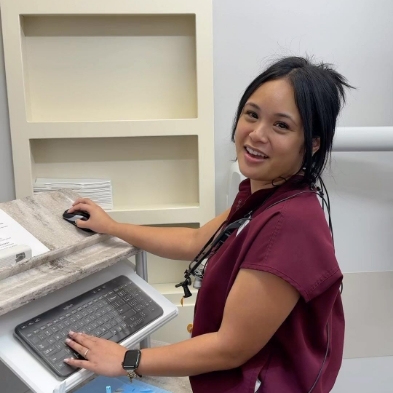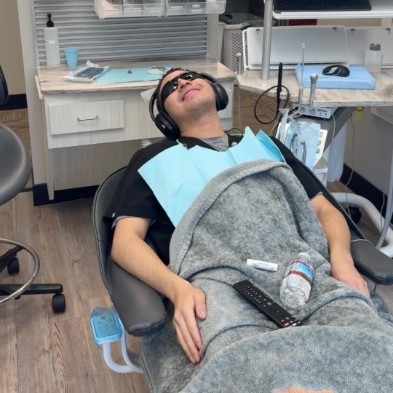TMJ Treatment Arlington Heights
Reducing Chronic Jaw Pain & Improving Jaw Mobility
The temporomandibular joints (TMJ) connect the jaw to the skull bone, allowing for movements while speaking, chewing, and smiling. When these small, delicate joints are damaged or strained, the result can be severe discomfort and limited jaw mobility. It is essential that you contact our dental team right away to learn about our options for TMJ treatment in Arlington Heights. The sooner we get to work on repairing the damage and reducing your chronic jaw pain, the better.
Why Choose Westgate Dental Care for TMJ Treatment?
- Customized Therapy for Teeth Grinding
- Experienced Team of Experts
- Reduced TMJ Pain & Discomfort
What Is TMJ Disorder?

TMJ disorder, also known as TMJ dysfunction or simply TMD, occurs when the TMJ gets strained or injured. This issue can have numerous causes, such as teeth grinding, a misaligned bite, an accident, stress, or other factors. In some cases, the cause remains unknown.
TMD has the potential to significantly affect your daily quality of life, and often, it does not go away on its own. That is why we encourage patients to seek treatment as soon as they recognize a problem.
Symptoms of TMJ Disorder

TMD can cause hundreds of different symptoms. Here are some of the most common:
- Pain when moving the jaw.
- Clicking or grinding sound when moving the jaw.
- Limited mobility or inability to open the mouth (lock jaw).
- Difficulty chewing tough foods.
- Swelling and tenderness in the jaw.
- Chronic radiating neck, shoulder, or back pain.
- Frequent headaches and/or migraines.
- Changes in the way the upper and lower teeth fit together.
- Earaches or ringing in the ears.
Types of TMJ Treatment

An accurate diagnosis is the first step toward repairing damage and renewing jaw mobility. Our team will look for warning signs of TMJ dysfunction during every six-month appointment, but please let your dentist or one of our team members know right away if you are experiencing symptoms. After a thorough evaluation of the situation, we will recommend your next steps.
If your case is particularly complex or severe, we might refer you to a local specialist. Otherwise, we may advise you to start doing daily stretches and exercises with your jaw. We might also recommend anti-inflammatory medications to reduce your discomfort. Changes in diet and other home remedies could help as well.
Often, we urge patients to combine their home remedies with a custom-made occlusal splint.
Occlusal Splint

An occlusal splint is a custom appliance that places a protective barrier between the upper and lower teeth at night, thereby preventing teeth grinding. It can also slightly reposition the jaw to relax overworked muscles and reduce TMD symptoms. Many patients who use an occlusal splint near Palatine can find long-term relief from their pain.
TMJ Treatment FAQs
If you are struggling with jaw pain and other symptoms of TMD, our team is ready to assess the situation and get you on the path toward relief. Before you book your consultation, though, we understand if you want to gather more information about the path in front of you. To assist you, we have put together a list of answers to some FAQs about TMJ treatment. If your specific questions are not touched on here, give us a call. We will be happy to speak with you!
Can TMJ Be Cured Permanently?
Some forms of TMJ treatment, such as home remedies, can provide fast but temporary relief. Other treatments can produce long-term results. For example, an occlusal splint may be able to help your jaw muscles relax and eliminate teeth grinding, thereby providing long-lasting relief from your symptoms. Often, combining short-term and long-term strategies is the best way to address TMD.
Is TMJ Treatment Safe?
TMJ treatment is usually a low-risk endeavor. Something like an occlusal splint is completely noninvasive and unlikely to cause harm — in fact, it is likely to help your jaw heal!
Of course, if we have to refer you to a specialist for surgery, a higher level of risk is involved. However, the potential rewards of treatment far outweigh any possible downsides. Plus, we only send patients to specialists for whom we have the utmost trust and respect.
If you have to undergo an invasive procedure, ask your doctor about potential risks. They should be very upfront with you about the details of your treatment plan.
Is TMJ Treatment Expensive?
The cost of TMJ treatment can vary from case to case. When you visit us for your consultation, we will determine which treatment we believe is suitable for your situation. From there, we will be able to discuss pricing. Occlusal splints are generally more affordable than invasive treatment options.
If you feel your treatment plan is expensive, remember the benefits you will experience! A healthy, functioning mouth is a priceless asset that can have whole-body health advantages.
Is TMJ Treatment Covered by Insurance?
Insurance coverage for TMJ treatment can be unpredictable. Some treatments are more likely to be covered, while others are rarely covered. It is worth checking with both your dental and medical policies to find out how they may apply to your unique situation.
Our practice welcomes insurance, and we will do what we can to verify your coverage and, if necessary, procure pre-authorization for your TMJ therapy.
If your insurance will not help you pay for your treatment, ask us about other ways to make your care more affordable. For example, you might be eligible for financing. We also have an in-house savings plan that provides a significant discount on virtually all the services available in our practice.
I Need a Checkup & Cleaning I am Looking for a Dentist for My Child I am Concerned About Bleeding Gums I Have a Cavity or Broken Tooth I am Missing One or More Teeth I am Unhappy with My Smile I am Scared of the Dentist I am in Pain & Need Help I Need My Wisdom Teeth Removed I am Concerned about Sleep Apnea I Would Like to Reduce the Appearance of Fine Lines & Wrinkles View Our Services





